May 30, 2025

The essential elements of an RBT job description are critical for success. Implementing behavior intervention plans, collecting data, collaborating with BCBAs, and adhering to ethical standards are not just tasks; they are the foundation of effective support for clients' needs. These components ensure that Registered Behavior Technicians contribute significantly to treatment efficacy and maintain professionalism. Ultimately, this enhances client outcomes in Applied Behavior Analysis (ABA) therapy.
Are you aware of the impact that a well-defined job description can have on your hiring process? Consider how these elements can streamline your recruitment efforts and improve client support.
In the dynamic realm of Applied Behavior Analysis (ABA), the role of Registered Behavior Technicians (RBTs) has become increasingly vital in delivering effective therapeutic interventions. The responsibilities of RBTs encompass more than just the implementation of behavior plans; they are crucial contributors to:
As the demand for RBTs rises—reflecting a growing acknowledgment of their impact on individuals with autism and other developmental challenges—grasping their roles, qualifications, and the environments in which they operate is essential. This article explores:
By illuminating the significant contributions RBTs make, we underscore their role in enhancing client outcomes and fostering a supportive therapeutic environment.
The RBT job description indicates that Registered Behavior Technicians (RBTs) play an essential role in delivering behavior-analytic services under the guidance of a Board Certified Behavior Analyst (BCBA). As of 2025, the RBT job description indicates that their core responsibilities have evolved significantly, including:
Recent statistics reveal that approximately 68% of RBTs hold bachelor's degrees, although certification only requires a high school diploma. This educational background often correlates with enhanced skills, particularly in early intervention and managing severe behaviors, enabling RBTs to command higher salaries. Furthermore, the RBT job description increasingly highlights the involvement of RBTs in the successful implementation of behavior intervention plans. Studies show that those who present data-driven achievements during salary negotiations can secure raises averaging 15% higher than their peers. Additionally, part-time and per-diem positions generally provide a 10-15% hourly wage premium, creating further opportunities for RBTs to increase their income. Understanding the , which is 39 years old, offers valuable demographic context about the field. To prepare for salary discussions, RBTs should gather data on their achievements and be ready to articulate their contributions effectively.
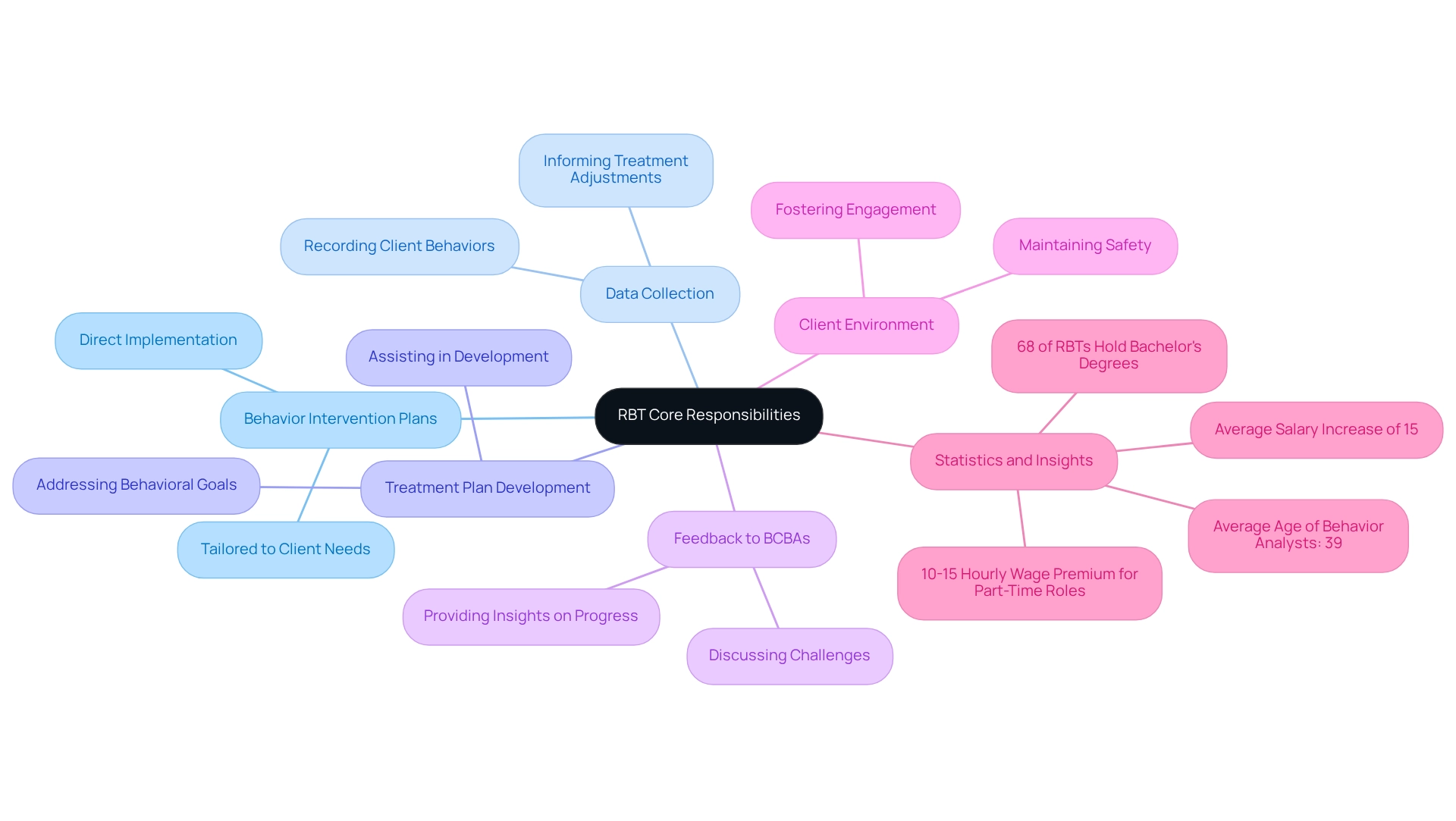
To become a Registered Behavior Technician (RBT), candidates must fulfill several essential qualifications as stated in the RBT job description:
In addition to these qualifications, individuals in this role should possess key skills such as strong communication abilities, patience, and a collaborative spirit to effectively engage with clients and their families.
The demand for these professionals is on the rise. Projections indicate a job growth rate between 12% and 22% over the next decade, significantly outpacing the average growth rate of 5%. This trend underscores the importance of RBT certification, which validates a technician's skills and enhances career advancement opportunities within the field of Applied Behavior Analysis (ABA). As the quantity of certified behavior technicians by the BACB remains notably high in states like Indiana, Florida, and California, it reflects the growing acknowledgment of the role's significance in assisting individuals with autism.
For those aspiring to enter this rewarding field, understanding the qualifications and skills required is the first step toward a successful career in ABA. Have you considered how to effectively present these qualifications? Hire ABA offers personalized resume assessments to help candidates showcase their skills, ensuring they are matched with roles that align with their preferences and career goals. Resources are also available for those seeking to understand how to become an RBT, including the RBT job description and preparation for interviews, providing valuable guidance for prospective candidates.
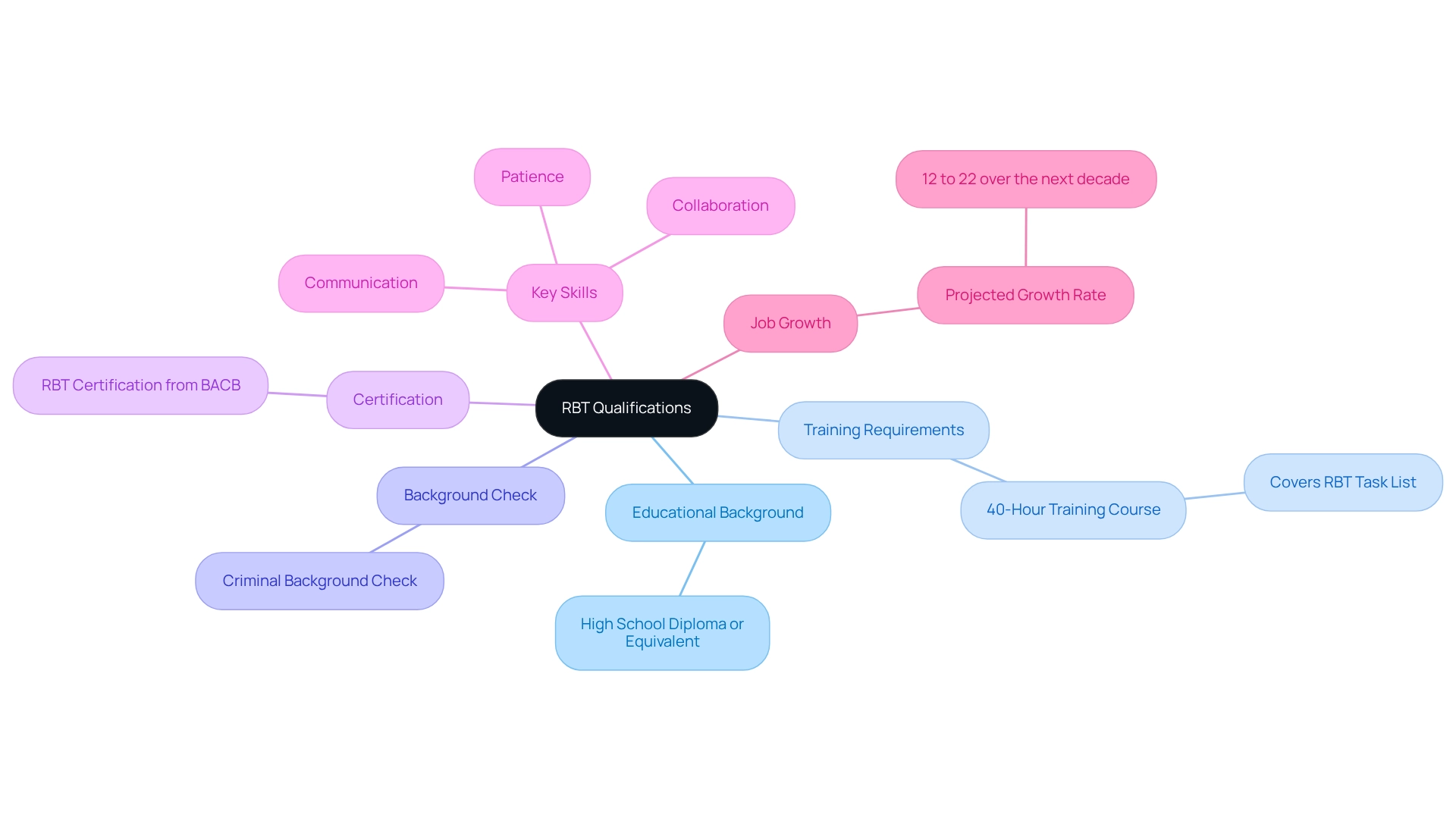
The daily duties specified in the rbt job description are essential for the effective provision of (ABA) services. In fact, the demand for registered behavior technicians, as outlined in the rbt job description, is soaring, with the behavior analysis field experiencing over 17% growth year-over-year. This statistic underscores the critical role RBTs play in assisting individuals with autism and other developmental challenges.
Key tasks typically include:
The rbt job description emphasizes that Registered Behavior Technicians play a vital role in conducting functional assessments, which help identify the causes of challenging behaviors. This process is essential as it aligns with the rbt job description, enabling registered behavior technicians to collaborate effectively with BCBAs in developing targeted intervention strategies. Such collaboration not only enhances the quality of care but also empowers clients to thrive in various environments through skill generalization—the ability to apply learned skills across different contexts. As the field evolves, the rbt job description becomes increasingly integral to the implementation of effective, individualized treatment plans that foster growth and development. Are you facing challenges in hiring qualified RBTs? Consider leveraging the expertise of platforms like Hire ABA to ensure you have the right professionals on your team.
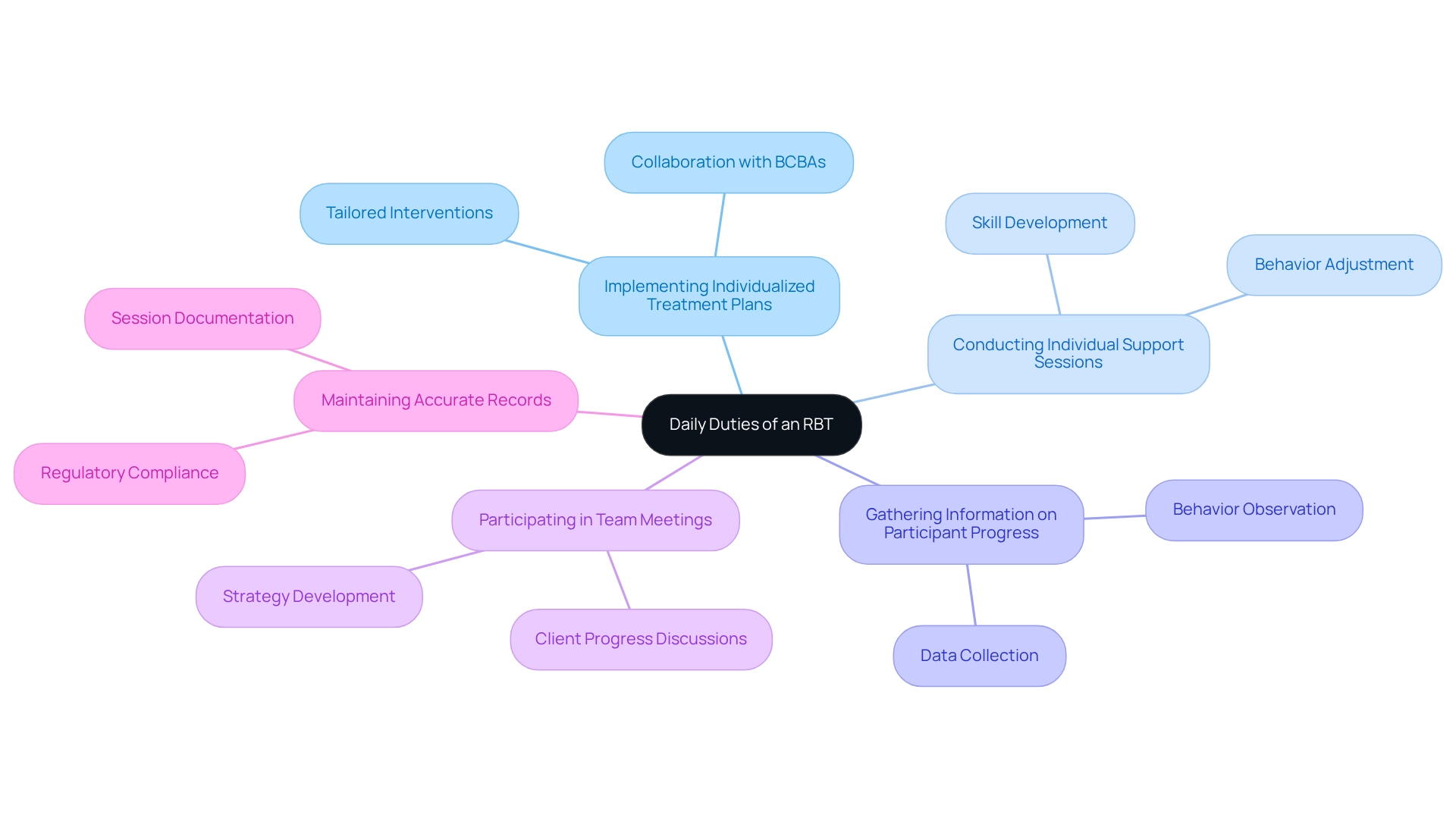
The rbt job description highlights that data collection and analysis are essential duties for Registered Behavior Technicians, directly influencing the effectiveness of Applied Behavior Analysis (ABA) therapy. With the (BCBAs) expected to increase by 25% by 2026, the rbt job description highlights the increasingly crucial role of Registered Behavior Technicians in data gathering and analysis. These professionals utilize a range of data-gathering techniques, such as:
to collect accurate information on client behaviors. This systematic approach enables behavior technicians to monitor progress and recognize patterns over time, ultimately leading to improved therapeutic outcomes.
Once data is gathered, behavior technicians examine it to identify trends that guide treatment modifications. This analysis is vital, as it allows behavioral therapists to make evidence-based decisions that enhance care for individuals, aligning with the rbt job description. Frequent reporting of findings to overseeing BCBAs ensures that treatment plans are consistently refined and aligned with the needs of clients. Have you considered how effectively your current hiring practices align with these evolving demands?
The importance of data analysis in ABA therapy cannot be overstated. It not only aids in creating effective interventions but also fosters a collaborative atmosphere where Registered Behavior Technicians can meet their rbt job description alongside Board Certified Behavior Analysts to enhance care. For instance, a case study on creating predictable daily structures for children with Autism Spectrum Disorder (ASD) demonstrated that establishing consistent routines, guided by data-driven insights, significantly improved functional skills in children. This case study illustrates how the rbt job description emphasizes the application of data analysis techniques by Registered Behavior Technicians to guide their practice and improve patient outcomes. By mastering data collection and analysis skills as outlined in the rbt job description, Registered Behavior Technicians contribute to the overall success of applied behavior analysis, ensuring that interventions are both effective and responsive to the changing needs of individuals. As Vik Paruchuri, founder of Dataquest, advocates, aspiring professionals should take charge of their education and explore fields that captivate them. This is particularly pertinent for those in data roles to enhance their expertise. Moreover, grasping the current conversations regarding ABA therapy, like those emphasized by Brighter Strides ABA, can offer Registered Behavior Technicians a broader perspective on their work, highlighting the significance of incorporating evidence-based practices that respect individual values and clinical expertise.
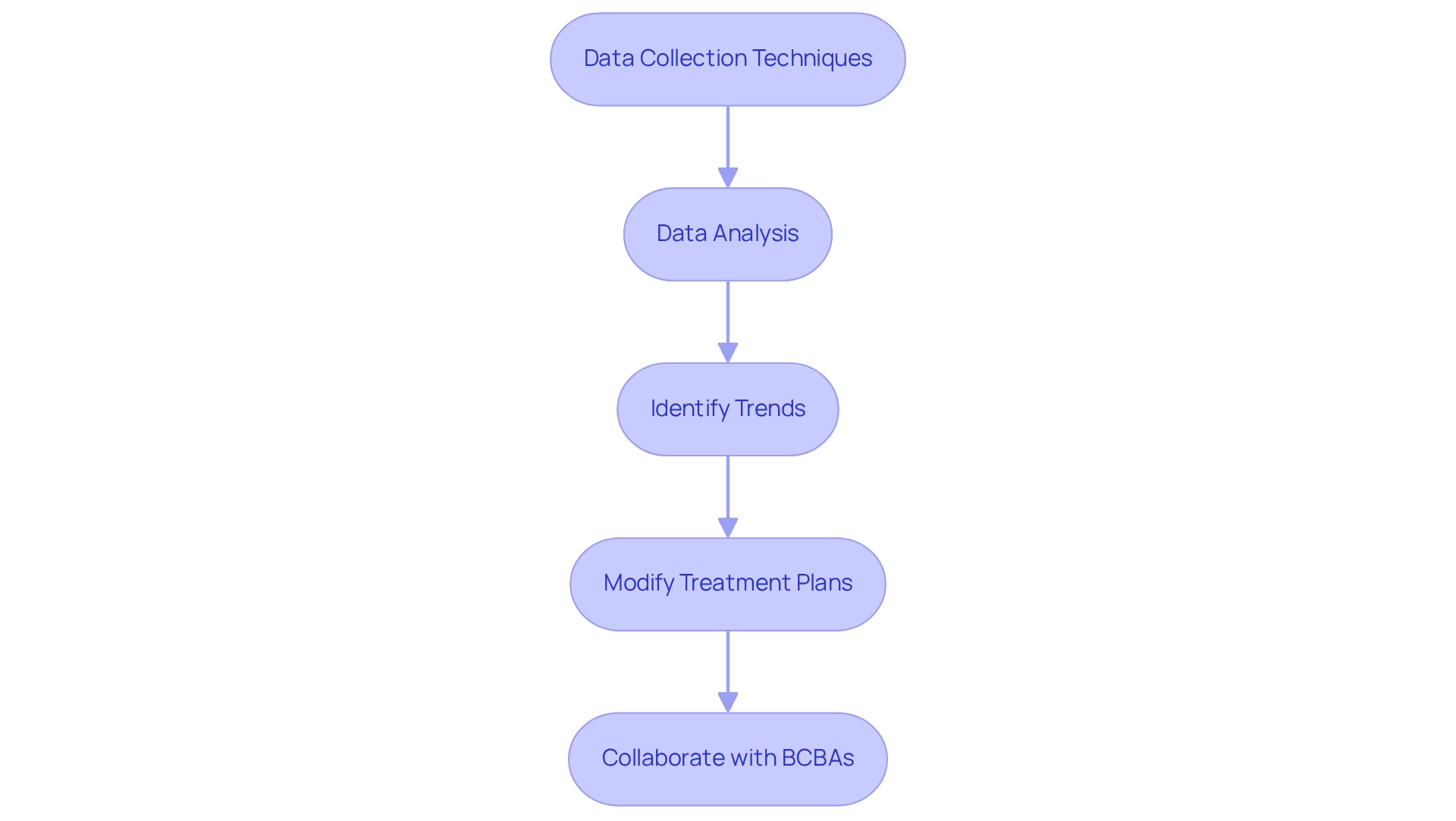
The demand for Board Certified Behavior Analysts (BCBAs) is projected to grow by 25% by 2026, underscoring the critical need for effective collaboration in Applied Behavior Analysis (ABA) treatment. The RBT job description emphasizes that Registered Behavior Technicians (RBTs) play a crucial role in the success of those they assist by working closely with BCBAs. This partnership is characterized by several key elements:
The significance of collaboration in ABA treatment cannot be overstated. Studies indicate that effective collaboration between RBTs and BCBAs significantly enhances treatment efficacy, leading to improved client outcomes. For instance, a recent case study on ABA interventions revealed that when RBTs and BCBAs collaborated effectively, children with autism exhibited significant behavior changes. This underscores the necessity of a strong collaborative framework in the ABA workforce.
As the demand for BCBAs increases, effective communication and teamwork will be essential in this expanding field. Moreover, successful teamwork can result in career growth prospects, such as increased salaries and leadership positions. Thus, it is essential for RBTs to actively engage with BCBAs. As one parent pointed out, "After having both children diagnosed and by a local doctor, they began treatment shortly after," highlighting the critical nature of timely collaboration.
To maximize your impact in this field, consider seeking out mentorship opportunities and actively participating in team discussions.
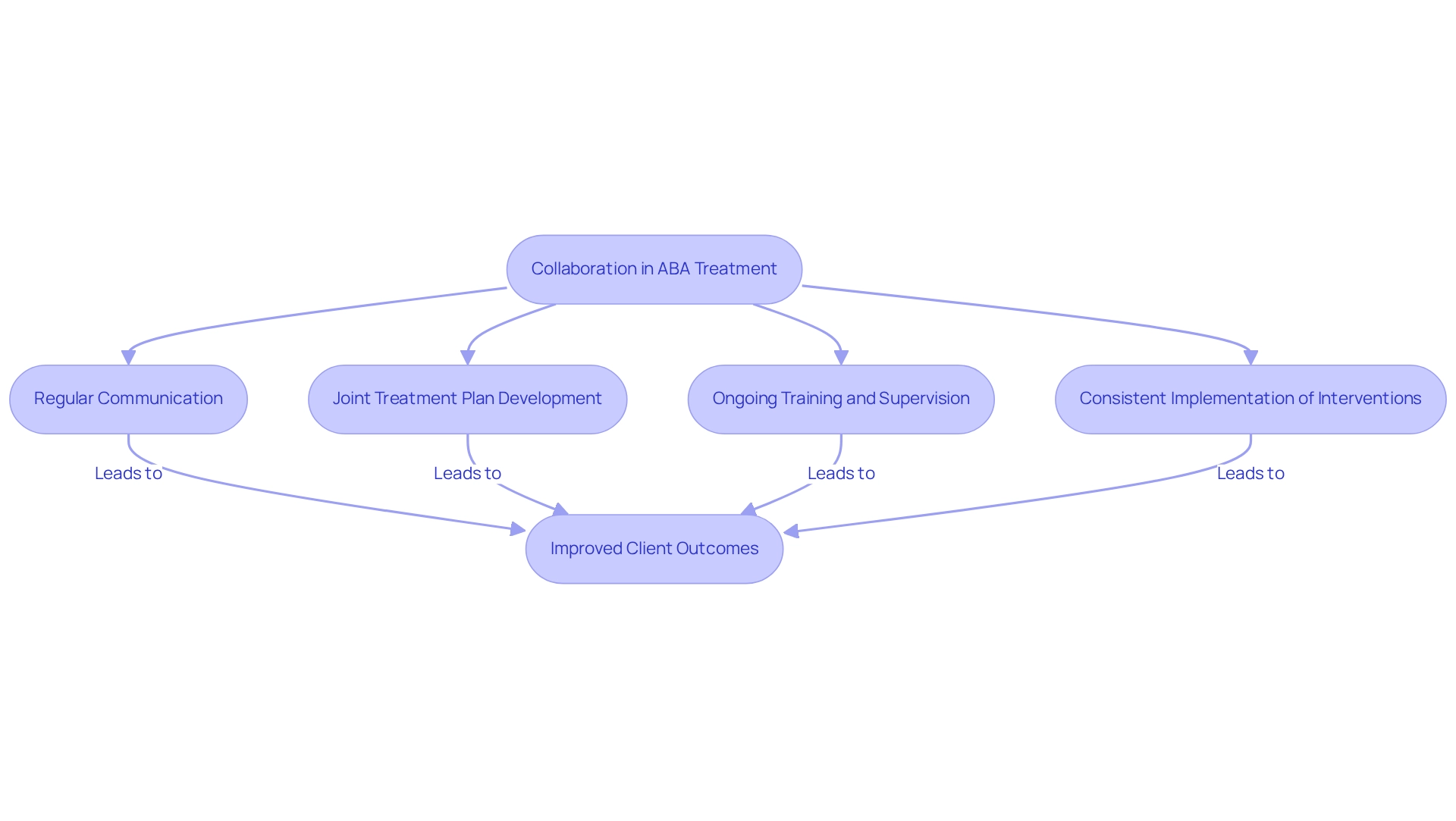
highlights the crucial role that (RBTs) play in the field of Applied Behavior Analysis therapy, working across a variety of settings to support individuals with diverse needs. Their work environments include:
The dynamic nature of RBT roles across these environments highlights the flexibility and adaptability required in this profession. As the demand for ABA therapy continues to rise, the rbt job description will reveal more opportunities for registered behavior technicians to make a significant impact in various contexts. It is important to note that while job growth for BCBAs is projected at 22% from 2018 to 2028, the demand for registered behavior technicians, detailed in the rbt job description, is also expected to increase as more individuals seek ABA services. Additionally, the types of training and support offered to registered behavior technicians, as emphasized by Colombo et al., are vital for their effectiveness in these roles. Furthermore, the flexibility of career opportunities in ABA therapy, including part-time work, makes this field appealing for many professionals.
The rbt job description emphasizes that Registered Behavior Technicians are expected to uphold rigorous ethical standards that are fundamental to their practice. These standards include:
In addition to these core responsibilities, the rbt job description highlights that fostering an ethical workplace culture is crucial. Leaders in ABA environments play a crucial role in modeling ethical behavior and ensuring that the rbt job description includes guidance for registered behavior technicians in ethical practices. For instance, a case study titled "Fostering an Ethical Workplace Culture" highlights how supportive environments encourage RBTs to discuss ethical concerns openly, enhancing overall ethical standards in practice. As Michael T., a middle school instructor, observed, "We were reluctant about beginning ABA treatment, but Move Up ABA’s method reassured us from day one. Our twins have made incredible strides in their social skills and self-regulation. The therapists are like extended family now, and we couldn’t be happier with our decision to work with them." This demonstrates the in ABA intervention. As the demand for BCBAs and registered behavior technicians continues to rise—projected to increase by 25% by 2026—adhering to these ethical standards will be vital for maintaining the integrity and effectiveness of ABA therapy.
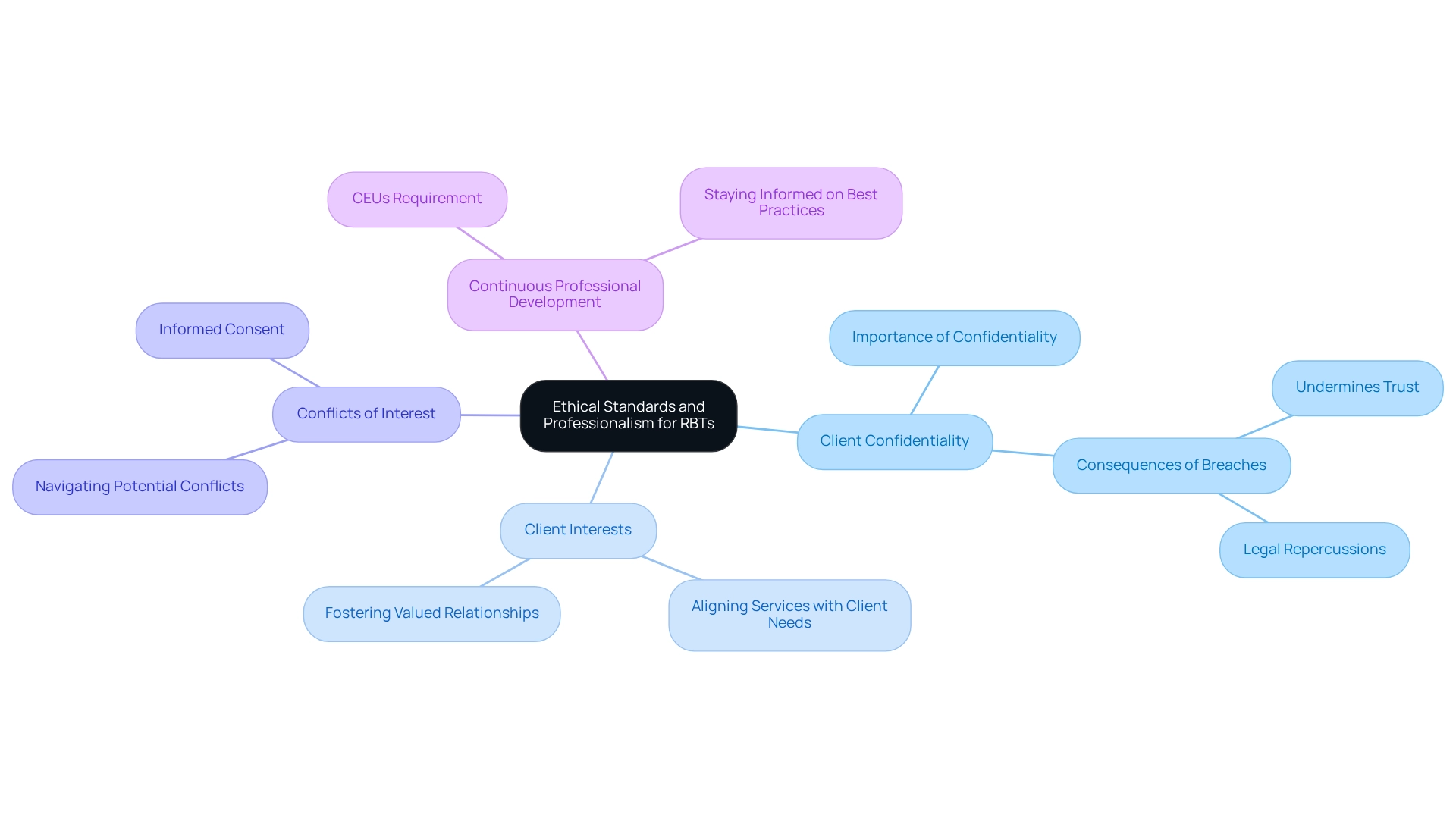
The demand for Board Certified Behavior Analysts (BCBAs) is projected to increase by 25% by 2026, highlighting a significant opportunity for [Registered Behavior Technicians (RBTs)](https://hireaba.today) to advance their careers. The RBT job description highlights numerous pathways for career advancement that Registered Behavior Technicians can pursue to significantly enhance their professional trajectory. Key opportunities include:
The journey from RBT to BCBA is supported by various educational programs, such as the 40-hour Registered Behavior Technician Training offered by institutions like UTSA, which equips individuals with the foundational skills necessary for certification. As Registered Behavior Technicians explore these pathways, they not only advance their careers but also play a crucial role in improving the quality of care provided to individuals with behavioral challenges.
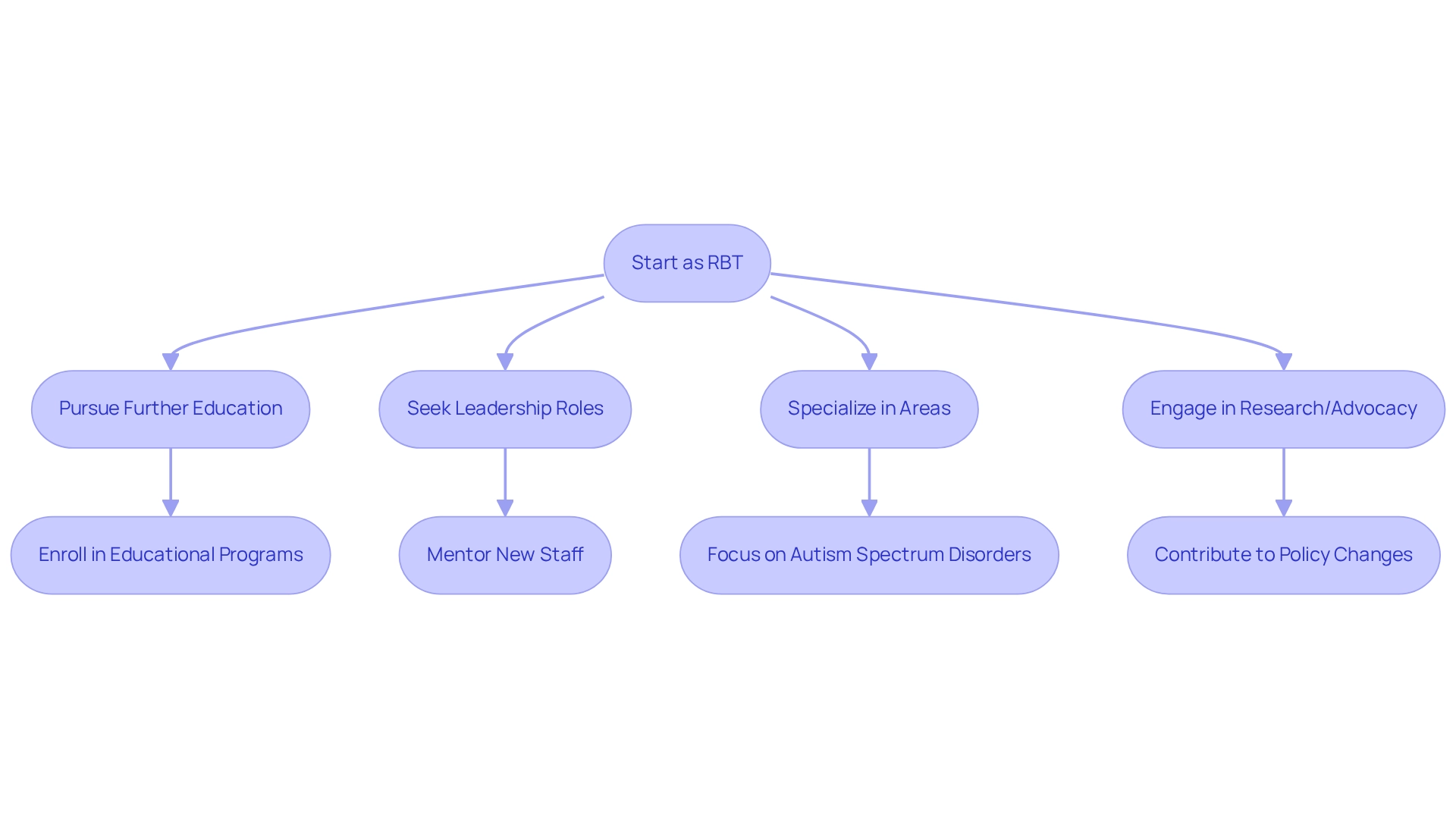
The (BCBAs) is projected to increase by 25% by 2026, emphasizing the critical role outlined in the RBT job description for Registered Behavior Technicians (RBTs) in delivering effective ABA therapy. The RBT job description outlines how RBTs are instrumental in improving client outcomes through several key functions, including:
The RBT job description illustrates how behavioral technicians involve individuals in the therapeutic process, fostering trust and motivating active participation in their own growth. Additionally, the effectiveness of registered behavior technicians in ABA therapy is underscored by findings from the case study titled 'Support and Empowerment for Individuals with Autism,' which discusses the ongoing support provided by these professionals. This study emphasizes how behavior technicians not only support behavioral change but also enable clients to attain greater independence, ultimately improving their quality of life.
Furthermore, the RBT job description highlights that registered behavior technicians serve as mentors, advocates, and partners in the journey towards positive behavioral change and enhanced quality of life for individuals with autism. Listening to the viewpoints of autistic individuals can further enhance ABA practices, reinforcing the supportive atmosphere that behavior technicians create. Clients who receive consistent assistance from behavior technicians show improved skill acquisition rates, demonstrating the significant impact these professionals have on client outcomes. As the demand for BCBAs continues to rise, the RBT job description becomes increasingly vital in delivering impactful ABA therapy. Are you facing challenges in hiring qualified professionals? Consider how Hire ABA can address these issues effectively.
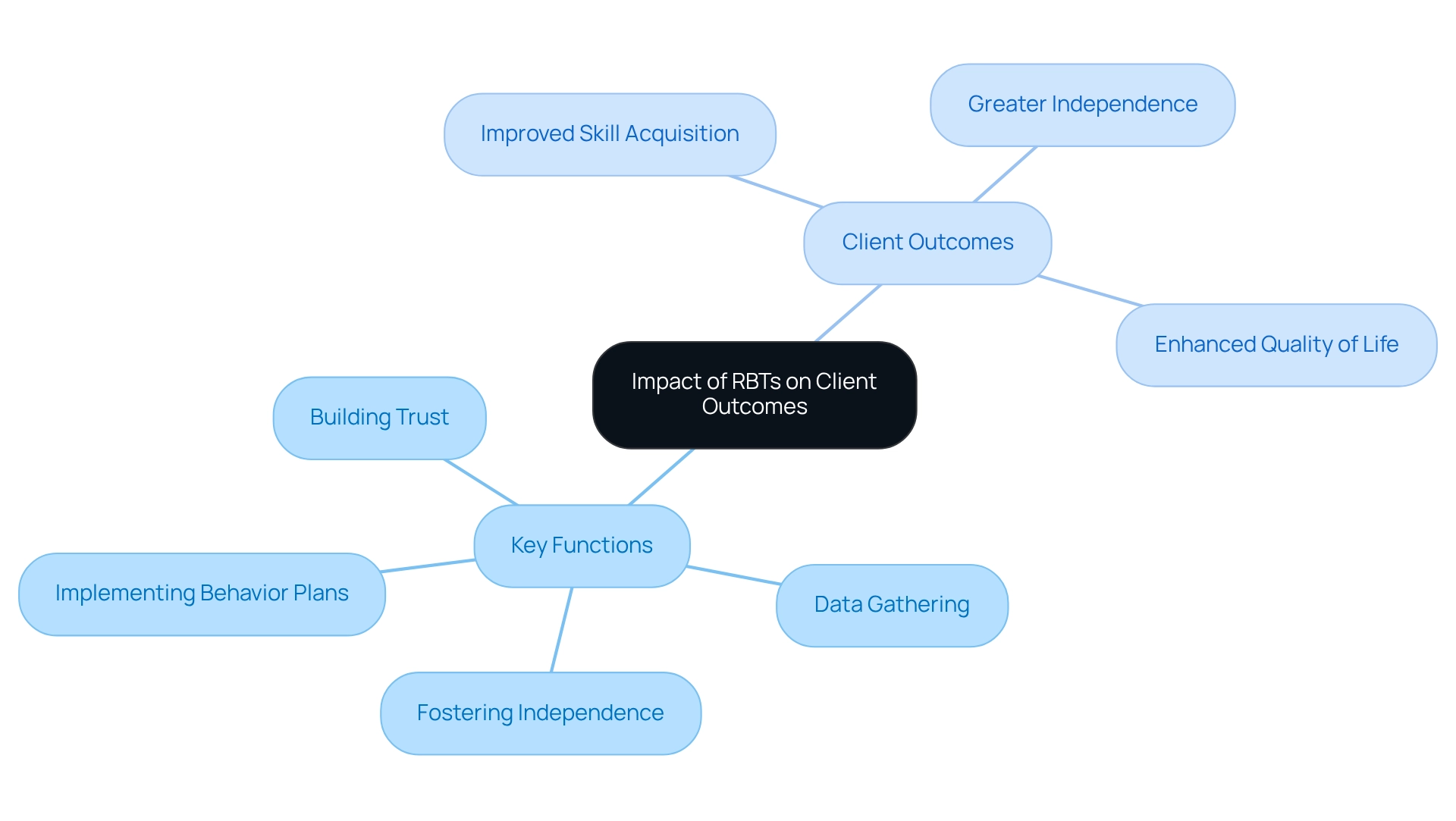
The demand for (BCBAs) is on the rise, with projections indicating a remarkable 25% increase in job opportunities by 2026. In this competitive landscape, Hire ABA stands out as an essential recruitment platform dedicated to connecting qualified Registered Behavior Technicians (RBTs) with top job opportunities that align with the RBT job description in the ABA field.
By leveraging our platform, job seekers can explore a diverse array of job listings specifically tailored to their qualifications and career goals. They will experience a streamlined application process designed to save time and reduce barriers to employment. Additionally, valuable support and resources are readily accessible, aimed at enhancing their job search and professional development. This includes personalized resume assessments that optimize job matching through advanced job fit scoring, ensuring that registered behavior technicians are presented with roles that align closely with their skills and aspirations.
Have you considered how challenging it can be to find the right job in such a fast-evolving field? Engage with employers who recognize and appreciate your skills and expertise through Hire ABA. As the demand for BCBAs and registered behavior technicians continues to grow, it is crucial to utilize a specialized recruitment platform like Hire ABA that includes a clear RBT job description. Our platform not only links behavior technicians with potential employers but also fosters a supportive community that enhances peer engagement and social outcomes in ABA therapy. Thus, board-certified behavior analysts will remain in high demand for the foreseeable future. It is imperative for RBTs to utilize Hire ABA to secure their future in this expanding field.
Registered Behavior Technicians (RBTs) are increasingly recognized as essential players in the field of Applied Behavior Analysis (ABA), contributing significantly to client success through their diverse responsibilities. Their core functions encompass:
These activities not only enhance treatment efficacy but also empower clients, fostering independence and improving overall quality of life.
As the demand for RBTs continues to surge, their career pathways are expanding. Opportunities for further education, leadership roles, and specialization are paving the way for RBTs to advance professionally while making a meaningful impact in the lives of individuals with autism and other developmental challenges. The commitment to ethical standards and continuous professional development further ensures that RBTs remain effective and responsive to the needs of their clients.
In summary, RBTs play a pivotal role in the delivery of ABA therapy, and their contributions are vital for improving client outcomes. As the landscape of ABA evolves, the importance of RBTs will only grow, making their role not just relevant but indispensable in the therapeutic process. Embracing the opportunities for growth and collaboration will allow RBTs to continue enhancing the lives of those they serve, solidifying their place as key contributors in the field of behavior analysis.
What are the core responsibilities of a Registered Behavior Technician (RBT)?
RBTs are responsible for directly implementing behavior intervention plans tailored to individual client needs, collecting and recording data on client behaviors, assisting in developing comprehensive treatment plans, providing feedback to Board Certified Behavior Analysts (BCBAs) regarding client progress, and maintaining a safe and supportive environment for client engagement and learning.
What qualifications are required to become an RBT?
To become an RBT, candidates must have at least a high school diploma, complete a 40-hour training course covering the RBT Task List, pass a criminal background check, and obtain RBT certification from the Behavior Analyst Certification Board (BACB).
What skills are important for RBTs to possess?
Important skills for RBTs include strong communication abilities, patience, and a collaborative spirit to effectively engage with clients and their families.
What is the job growth projection for RBTs?
The job growth projection for RBTs is between 12% and 22% over the next decade, significantly higher than the average growth rate of 5%.
How does educational background impact RBT salaries?
Approximately 68% of RBTs hold bachelor's degrees, which often correlates with enhanced skills in early intervention and managing severe behaviors. This educational background can enable RBTs to command higher salaries.
What can RBTs do to prepare for salary discussions?
RBTs should gather data on their achievements and be ready to articulate their contributions effectively during salary discussions, as those who present data-driven achievements can secure raises averaging 15% higher than their peers.
What are the daily duties of an RBT?
Daily duties of an RBT include implementing individualized treatment plans, conducting individual support sessions, gathering information on participant progress, participating in team meetings, and maintaining accurate records of therapy sessions and interventions.
Why is the role of RBTs critical in the field of Applied Behavior Analysis (ABA)?
RBTs play a vital role in assisting individuals with autism and other developmental challenges, conducting functional assessments, and collaborating with BCBAs to develop targeted intervention strategies, which enhances the quality of care and supports client growth.
Our expert recruitment strategies and AI-driven sourcing ensure that you receive top-notch candidates quickly, without compromising on quality. Whether you’re looking for BCBAs, Clinical Directors, or RBTs, we’ve got you covered.